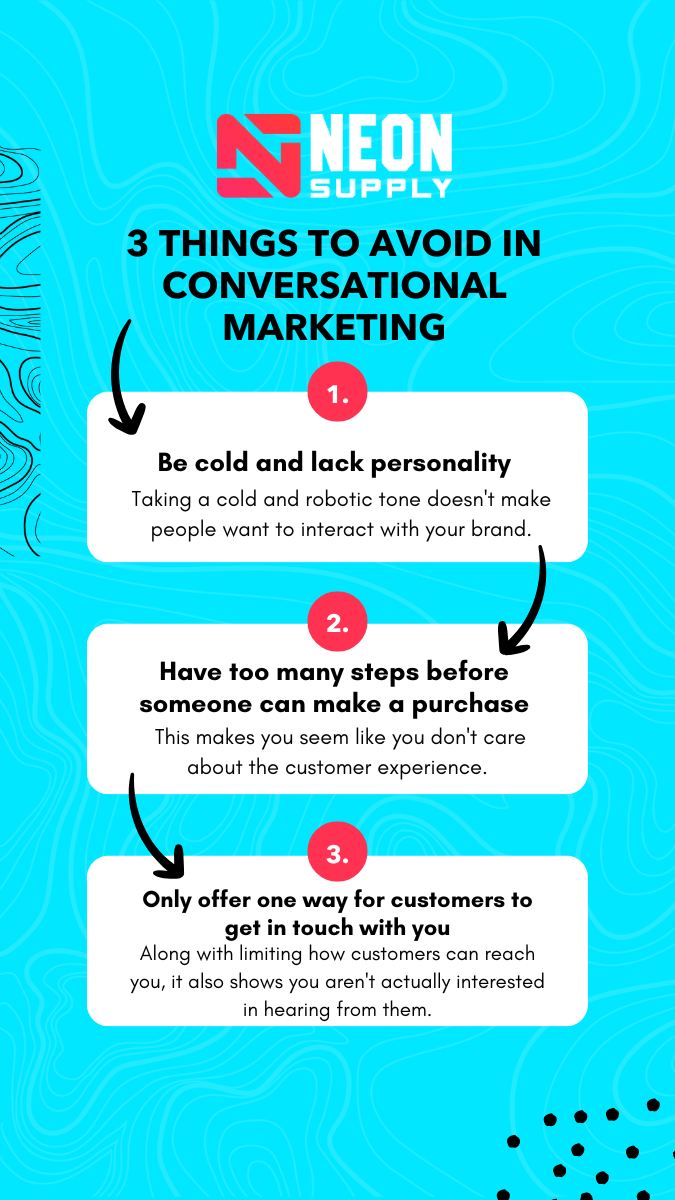HubSpot outlined in its 2022 State of Marketing Report that customers are craving connection. Customers are facing immense political, social, and economical issues, and when they turn to their emails or social media apps, they want to feel genuinely connected to something in order to feel better.
But they don't always get that. As HubSpot's CCO Yamini Rangan points out, businesses are grappling with disconnected systems that allow critical data to slip through the cracks which in turn is causing a greater disconnect between businesses and their customer base.
These conditions have led to conversational marketing becoming increasingly important to address customer needs. This marketing approach addresses those widespread feelings of disconnect and fosters strong relationships between customers and brands.
Conversational Marketing 101
Conversational marketing is the practice of treating your marketing efforts as avenues for ongoing dialogue between you and your customers. It encourages brands to actually talk to instead of at their customers; to find out what excites them and why they choose your brand over competitors. Chances are they're making that choice not just because the product quality is superior, but also because of a better customer experience.
Connection is everything, and conversational marketing is the key to building those relationships. Ultimately, it will help you build a base of more engaged and loyal customers.
Do This!
1. Focus on dialogue-driven activities throughout your inbound marketingConversational marketing depends upon open and continuous dialogue between a business and its customers. Every piece of marketing content you create needs to focus on cultivating that dialogue.
You can build interactive elements into your marketing in a number of ways. Using email replies allows recipients to get in touch with you directly. It's a good idea to set up a dedicated email inbox for these replies and to schedule reminders to check it regularly.
Offering personalized recommendations also fits the conversational marketing framework. It enhances the customer experience and demonstrates you're going the extra mile to find products they'll love.
With the data available from all of these conversations, you can then use it to gain an even better understanding of your customers and develop more offerings that they'll love.
That way, your customers can get quick answers without your team's day being consumed with answering the same questions multiple times. There are lots of tools you can use for this, from conventional typing chatbots to voice assistants.
More complex questions can prompt the bot to direct them to a person who can address their questions or concerns. If resources allow, you may want to offer different options for live chat, like email follow-ups, assistance directly in the chat window, or a phone call. This shows customers you care about responding to them and will do what's needed to ensure their comfort.
This is likely a given across all marketing approaches, and it's also an integral part of conversational marketing. Easy purchasing shows customers that you truly care about addressing their needs every step of the way.
This means offering secure information auto-fill, making it easy to access their cart, and avoiding having too many steps to complete the purchase. You can find out more about your customer demographics and buying behaviours in follow-up emails after the purchase, so don't ask questions about their interests while they're trying to checkout.
Although there will likely be similarities among your target audience in terms of their preferred channels, you still want to be able to give them options.
Having a few different social media channels can cover the bases of what your customers prefer. Some may opt to engage with you through email newsletters and you may want to set up a segment of your most engaged subscribers to communicate with more regularly.
Don't Do This

People want to engage and converse with brands that are warm, welcoming, and have a consistent personality. Taking a cold and robotic tone doesn't make people want to interact with your brand, and your overall engagement and sales will take a hit because of it.
This makes you seem like you don't care about the customer experience—if you did, you'd be making it easy for them to buy. Simplify the process as much as possible for them.
If you're not sure how to do that, try sending out a post-purchase feedback survey asking for their thoughts. compile the common responses and use those to make the necessary changes to make it even better next time.
Not only does this limit how customers can reach you, but it also shows that you aren't actually interested in hearing from your customers.
Offering phone numbers, messaging services, email addresses, and social media channels as communication avenues demonstrate that connecting with your customers is a priority; this will make them more likely to literally respond to your messages.
Conclusion
Regardless of whether you choose to fully adopt the conversational marketing approach or just use bits and pieces, using some elements can help you build a strong marketing strategy. Be intentional about creating connections with your customers.
The results won't be instantaneous; it'll take time and consistent effort to see a noticeable difference in customer engagement. That said, it's worth the extra investment. Many brands won't want to change their marketing approach, so using conversational marketing will help you stand out.



